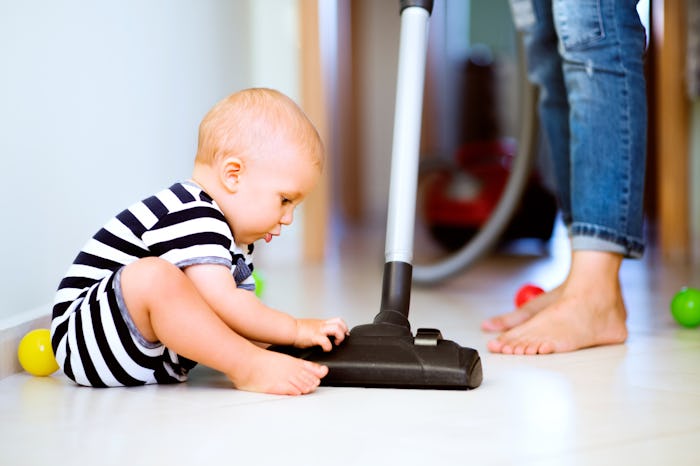Life

Guys, The Grossest Baby Accessory You Own Is *Not* What You're Thinking
Let's be honest: Kids are the sweetest of sweets, but they're also, well, gross. Between booger-y noses, exploratory play, and touching every surface known to mankind, children have a way of bringing dirt and germs to most situations. Parents and caregivers, of course, do their best to mitigate all of the chaos by wiping down hands and regularly spritzing hand sanitizer, but it's tough to stay on top of everything. That's why some everyday items might not get as much attention as they need. Curious about which ones are packing the ick factor? Here's the grossest baby accessory you own, and it might surprise you.
"We actually swabbed and analyzed common baby items to find the germiest ones, and the results weren't what we expected," Emily Patterson, a safety and security expert with ASecureLife.com, tells Romper in an email interview. "Strollers were the grossest — nearly two times as germy as the average bathroom floor!"
Um, yeah — that's gross. Patterson says pacifiers, sippy cups, and plush toys also ranked high on a list compiled by ASecureLife.com. The team says they expected television remotes to rank the highest on the list, but were surprised to find strollers in first place. It could have something to do, however, with the fact that strollers are often stored in garages, "so they experience temperature and humidity extremes that allow germs to grow, as well as dust, fumes, and pests," Patterson says.
The report also breaks down the most germ-laden items by taking a look at age, gender, room, and type of germ. That led researchers to discover that kids' bedrooms had the highest concentration of harmful germs, followed by the kitchen. Patterson says homes with boys had slightly higher germ concentrations than homes with girls, and homes with a stay-at-home parent were slightly cleaner than those in which both parents work.
When you do give your house a once over, some of the dirtiest places include faucets, handles and light switches, your bathroom, the walls surrounding the bathroom toilet, and — as Patterson and her colleagues predicted — television remotes, according to Better Homes & Gardens.
On the other hand, when you are out and about, Prevention noted you are going to want to steer clear of restroom door handles, condiments at a table, soap dispensers, grocery cart handles, and — you'll probably never see this one coming — the lemon wedge on your glass at a restaurant. A 2007 study in the Journal of Environmental Health showed nearly 70 percent of the lemon wedges on restaurant glasses contained microbial growth that could cause disease.
In order to eliminate at least some of germs that come along with everything involving kids and life, Patterson recommends cleaning everything regularly, which generally means removing dirt and debris by washing with soap and water. Sanitizing is also important, but keep in mind that, while it will reduce germs, it won't kill everything. Patterson says high chairs, toys, and pacifiers should be sanitized.
Disinfection is the ultimate defense against germs, including bacteria and viruses. "Spots that require disinfection are fairly obvious," Patterson says. "They include changing tables, door and/or cabinet handles, toilets, potty chairs, and bathroom surfaces."
When you're out and about, be sure to carry hand sanitizer and wipes in your bag, and take advantage of sanitizing cloths that are available at most stores to wipe down cart handles. Upon returning home, make washing hands a priority — yours and your kids'. The Centers for Disease Control and Prevention (CDC) recommends scrubbing your hands for at least 20 seconds. You can time it perfectly — and make it fun — by humming or singing the “Happy Birthday” song from beginning to end twice.
Because while kids and germs go together like peanut butter and jelly, it certainly doesn't have to be a lasting relationship, right?
Check out Romper's new video series, Bearing The Motherload, where disagreeing parents from different sides of an issue sit down with a mediator and talk about how to support (and not judge) each other’s parenting perspectives. New episodes air Mondays on Facebook.